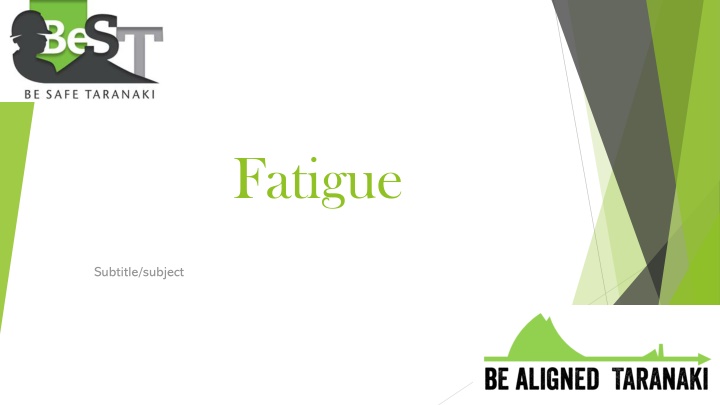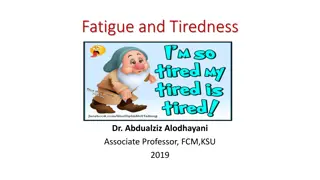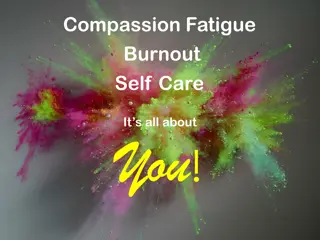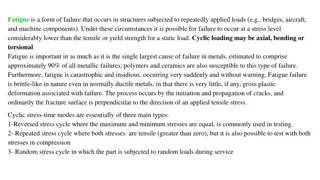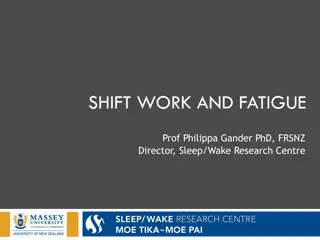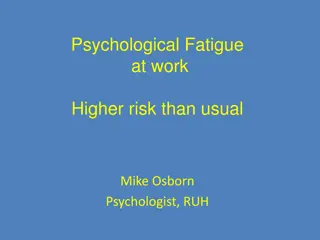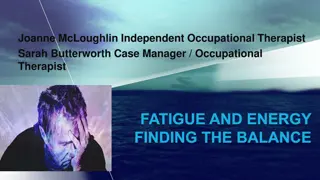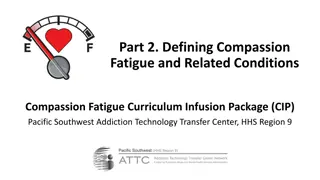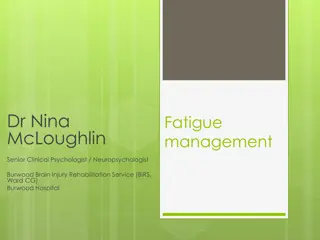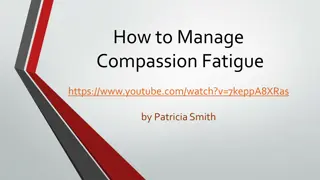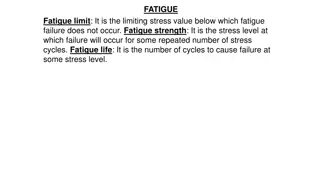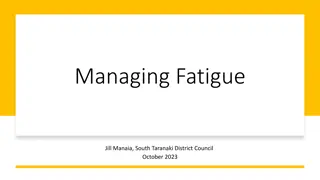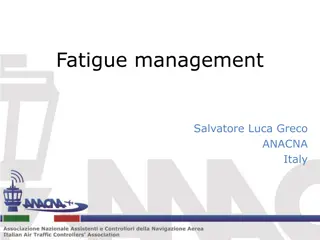Managing Fatigue in the Workplace
Fatigue is a state of physical and mental exhaustion that can lead to errors and accidents in the workplace. It is caused by a reduction in alertness and can be triggered by factors like extended working hours and high mental or physical demands. Recognizing the signs of fatigue, such as constant sleepiness and poor decision-making, early on is crucial to avoiding mistakes. Managing fatigue involves both workplace strategies like scheduling adequate breaks and individual practices like getting enough sleep and communicating concerns with supervisors. Prioritizing health and wellbeing in the face of fatigue is key to ensuring safety and effectiveness at work.
Download Presentation

Please find below an Image/Link to download the presentation.
The content on the website is provided AS IS for your information and personal use only. It may not be sold, licensed, or shared on other websites without obtaining consent from the author.If you encounter any issues during the download, it is possible that the publisher has removed the file from their server.
You are allowed to download the files provided on this website for personal or commercial use, subject to the condition that they are used lawfully. All files are the property of their respective owners.
The content on the website is provided AS IS for your information and personal use only. It may not be sold, licensed, or shared on other websites without obtaining consent from the author.
E N D
Presentation Transcript
Fatigue Subtitle/subject
What is Fatigue? Fatigue is a state of physical/and or mental exhaustion which can lead to errors. This is ultimately caused by a reduction in a person s level of alertness. Fatigued workers are: Less able to perform safely and effectively Less alert Less productive and; More likely to have accidents
Reasons for Fatigue in the Workplace Change in focus and work demand High demand mental and/or physical Extended working hours 7 day working weeks for a prolonged period
Signs of Fatigue: Constant sleepiness Poor communication Reduced energy Poor decision making Excessive yawning or falling asleep Poor coordination and/or slower reaction times Less vigilant Less creative problem solving Mood swings Cutting corners to complete a task Reduced attention span & more easily distracted Increased risk-taking Inability to concentrate Forgetfulness and Inability to handle large amounts of information
Some symptoms are not so obvious Headaches Dizziness Blurred vision Impaired visual perception Recognising signs and symptoms early can Recognising signs and symptoms early can mean avoiding mistakes mean avoiding mistakes This Photo by Unknown Author is licensed under CC BY
Managing Fatigue: Management at Work Allow for adequate and regular breaks to rest, eat and rehydrate the frequency and length of breaks need to match the time and effort demanded by the work load and task. Monitor and take account of previous hours worked and shift rotas when scheduling - the effects of fatigue are cumulative. If possible, plan for expected changes in work flow and ensure there are enough resources to carry out the work Limit periods of excessive physical/mental demands Recognise signs, symptoms & changes and address with workers.
Managing Fatigue: Individual Management Strategies Know your limitations limitations Get a good nights sleep between 7.5 and 9 hours of sleep to maintain health and alertness sleep People generally need Ensure you take breaks breaks Nutrition Eat healthy healthy and keep fluids up keep fluids up Work/life balance switch off switch off after work hours. Communicate Communicate with your line manager/supervisor who can affect change if signs of fatigue are identified by yourself or highlighted by your work mates Be vocal and SPEAK UP Be vocal and SPEAK UP this is a vital part of protecting your welfare and ensuring you get the help you need
Managing Fatigue: Balancing shift-work and home-life Make family and friends / neighbours aware Make family and friends / neighbours aware engaging with your family and friends / neighbours regarding shift patterns is important. Shift work significantly affects moods and behaviours. Being a shift-worker is a balancing act of family life alongside stressful jobs, long hours and rotating shifts ultimately leads to fatigue. balancing act juggling the demands Reflect Reflect on the amount of time spent at work and the family responsibilities you have. A shift-worker s battle is lack of sleep battle is lack of sleep which is a major contributor of fatigue - ensure your family understands your sleep/rest needs and can support you in this. With good communication, With good communication, engagment a great level of understanding a great level of understanding, shift work can offer families a happy balance of work and family life. engagment, healthy relationships and , healthy relationships and
Managing Fatigue: Co-workers Communicate Communicate and engage notice signs and symptoms of fatigue. and engage with your workmates if you Ensure your workmates take regular breaks. breaks. Nutrition Encourage your workmates to eat healthy and keep fluids up keep fluids up healthy Suggest your workmates engage with management signs and symptoms are recognised. engage with management if This Photo by Unknown Author is licensed under CC BY
Fatigue Management Factors to Consider Human Biology: Each individual s sleep pattern, body clock, health and age Life outside work: family and friends, social commitments, commuting. Management of other stressors BRAINSTORM WHAT THESE OTHER STRESSORS MIGHT BE Remember - we all have a life outside of work!
